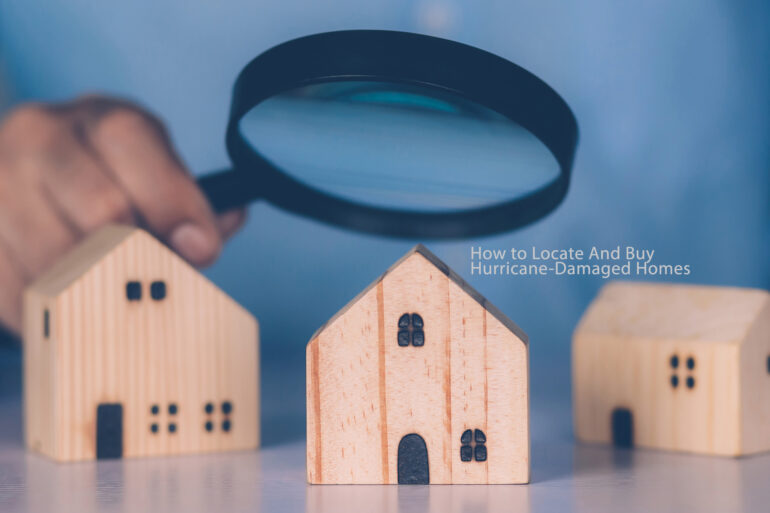How to Locate And Buy Hurricane-Damaged Homes?
Cape Coral and southwest Florida have a unique buying opportunity right now. Hurricane Ian hit southwest Florida and damaged a lot of homes. Some of these hurricane-damaged homes will get repaired, some will get listed on the market and sold as-is (I’m already seeing this), some owners will give the home back to the bank, and the bank will go through the auction process via the Lee County foreclosure auction.
If you’re looking for a distressed property to buy, live in, and renovate to make sweat equity, this is your opportunity.
Hurricane-Damaged Homes Create a Buying Opportunity
If you’re looking for a distressed property to buy, live in, and renovate to make sweat equity, this is your opportunity. Southwest Florida has a lot of hurricane-damaged homes. Homeowners are finding out if they will get insurance money and how much, or if FEMA will help. A lot of homeowners will realize that they will not get enough money to fix their homes and need to sell them as-is.
Get Your Financing Together First
Do you have cash? If not, do you have a line of equity? Some renovation loans are available, but they don’t really help the buyer accomplish the goal of being able to do a lot of the work. Most renovation loans require contractors to do the work. If you have a relationship with a contractor, this may work for you, but you’ll need to talk to a lender who specializes in rehab loans and see if your purchase goals will work. You could find a hard money lender to fund the loan, repair the home enough, then refinance the home into a long-term loan once the home will pass traditional appraisal requirements and is financeable. Getting your financing together is an important first step.
If I’m going to tie up capital, manage a renovation, and own all the risk, there has to be enough equity/profit for it to be worth it and for me.
How to Find Homes to Buy
Once you have an idea of how much capital you are able to invest, find an area hit by the hurricane, and drive around the area looking for homes with damage that interests you.
Write down all of the addresses. Then, skip trace the homeowner’s contact information. Skip tracing is what private investigators use to track down people’s contact information; you can use this service as well. Property Onion offers skip tracing. Once you’ve purchased the seller’s contact information, call them and see if they are interested in selling. These homes might be pretty beat up and not able to get traditional financing. That’s why having access to cash is very important. If the sellers say they may want to sell, schedule a time to view the home.
Discover Repair Value
After you’ve viewed the home, create a repair budget. I recommend bringing a contractor you trust, especially if you’ve never rehabbed a house, plus a second set of eyes is always helpful, too. I always take lots of pictures and sometimes video; this helps me remember the home when I’m back in my office figuring out the rehab budget. I typically subtract about 30% for my cash as-is offer. This is just how I do it. Some investors buy homes by subtracting 10% or 20%. You must decide what it’s worth to you.
It’s better to have no deals than deals that lose money.
Here’s how I crunch my numbers for example:
I find a home I’m interested in purchasing and determine it’s worth $400k after it’s all fixed up, also called ARV (after repair value). My repair budget to fix the home up is $100k. I take $400k – $100k repair cost = $300k – 30% (this is my equity or profit) = offer price $210k offer. You may want to go even lower as rising interest rates are pushing home prices down.
Why subtract 30%? For me, rehabbing a house is a LOT of work with lots of unknowns. It always costs more than you think and takes longer than you want. You will likely discover something you didn’t plan for; it’s just part of rehabbing houses. If I’m going to tie up capital, manage a renovation, and own all the risk, there has to be enough equity/profit for it to be worth it and for me. This is at least 30%, sometimes higher on the really bad homes I purchase. The higher the risk, the larger the rehab, and the more my profit margin percentage goes up.
Present Your Offer to the Seller
Let’s review:
- You’ve driven around neighborhoods looking for homes to buy and written down addresses.
- You’ve skip-traced the address to find the homeowner’s contact information.
- You’ve contacted the owner to see if they are interested in selling their home and scheduled an appointment.
- You’ve run your appointment with your general contractor and taken pictures. You determined after repair value and rehab budget, and you know what your offer will be.
- Present your offer.
Here’s how I present my offers – this is what works for me, and each investor does things differently. You’ll need to find what works for you. I call the seller and discuss my offer verbally. They are usually, not always, a bit surprised by how low my offer is. Most homeowners have no clue how costly it is to rehab a home or how much inflation and rising labor costs have exploded the cost. If they ask questions, I give explanations and always treat everyone with respect and dignity. It’s okay for them to tell me no. I’m not one to push or try to hard sell; it’s not my style… I give them my offer. Some people like to think about it, and if they do, I give them time. Some will say no, and some will say yes. Some try to negotiate. I don’t negotiate less than 30%, but that’s just me. I have a couple of times, and both times, I lost money. It’s better to have no deals than deals that lose money. If the seller and I agree verbally, I send a formal offer for signatures and provide proof of funds. Make sure your purchase agreement protects your interest, liens, and that you’re buying the home as-is but need a clear title. You may want to consult an attorney for this.
Pick a Title Company and Close
Once you have a signed contract with the Seller, find a title company that will clear the title and provide an owner policy (insurance on clear title). Check with the city if there are any open permits, and make sure to close them before you close, or at least be aware of them, maybe they are a non-issue.








